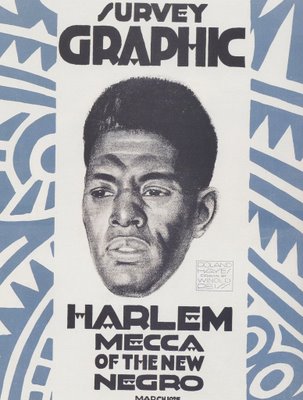
Winold Reiss was a German art student who painted in the Viennese style and came to America to meet American Indians but ended up in Harlem where he gained fame designing nightclubs and drawing portraits of black celebrities of the day. Are you following this so far?

Even if you are familiar with Reiss' work, you probably haven't seen his best efforts because they lie in storage at the National Portrait Gallery in Washington DC and rarely see the light of day. You can find some of his Indian portraits (yes, Reiss eventually made it to Montana) on a web site started by Reiss' family. But the books and magazines Reiss illustrated are out of print and it is difficult to find quality reproductions of his work. Here is a close up:

I think Reiss' Harlem work is strikingly beautiful. On the following portrait, you can tell from Reiss' signature way down in the corner that Reiss intended every single square inch of that white space.


The following pictures are examples of how Reiss combined his formal art training, the bold geometric patterns of the decorative arts movements in Germany and Vienna, and African American culture.

Survey Graphic was an important journal at the time of the Harlem Renaissance.

Reiss designed this bold interior for the "Congo Room" at the Hotel Almanac.


Historians tell us that the most important ingredient for a Renaissance is an openness to new ideas and external traditions. For example, the Great Renaissance which began in 14th century Europe resulted from the new cross fertilization of biblical traditions, classical Greek philosophical traditions, and Islamic influences.
In this same spirit, Reiss was receptive to a cross section of strong cultures and he helped create the style of the Harlem Renaissance. It demonstrates the value of keeping your mind and eyes open.
Reiss could not have melded these different cultures together without his powerful sense of design serving as the universal glue.

I'm wondering if he made this work (the negro ouvre) more or less at the same time Miguel Covarrubias was doing his "Negro drawings"...
ReplyDeleteThanks for another fascinating post.
Annendorf, Reiss and the talented Covarrubias were both caught up in the jazz, blues and dance of the Harlem Renaissance of the 1920s. It was the hottest thing around. (Covarrubias' illustrations at the time were selling for $300 while Picasso's originals were selling for $250. How's that for priorities?
ReplyDeletePainter X, the world is a cornucopia of artists who plied their trade making lovely objects and then moved quietly off the stage.
what a gift--thanks
ReplyDeleteDavid, thanks again for a great post. The portaits are marvaleous. I wonder if it's possible to see other works with a request to the NPG. I would deffinitely like to see more!
ReplyDeleteThanks again for enlightening those of us who wouldn't otherwise see these works.
ReplyDeleteOn Winold Reiss; It's rare to see art and be moved these days. It's stranger fruit to have it change the way you think. What are all these people looking at?? and what are they thinking?? (I'm refering to the portrait gallerys in the Reiss website)I get a sense of concealed agony. A reflections of the times? of culture? I am going back to look some more.
ReplyDeleteAlso for L.A. Stern; I know that certain museums do honor requests for private showings. I don't know if the national portrait gallery does, but I would certainly put it on my things to inquire about.
I totally love the black paintings.
ReplyDeleteplease see my Custom car paint jobs page.
that white tux one is really terrific
ReplyDelete